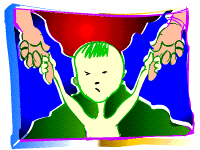There is a silent change happening in some pockets of India’s social fabric: couples are adopting children with AIDS. In a country where adoption itself is looked at with mixed feelings, by and large, bringing children with AIDS within the family circle is a big leap ahead. For, overwhlemingly large sections of Indian society look fearfully at AIDS as a scourge.

Nerves of Steel [Illustration by Shinod AP]
The couples who have come forward to adopt these children belong to different backgrounds – and not all of them are childless.
By adopting these children, the couples have taken the first of the difficult steps in helping them cope with life, by giving them a new lease of life, a sense of belonging.
“It is quite a breakthrough in a society where there’s so much stigma attached to AIDS and HIV patients,” says Ashok Rau, founder trustee of the foundation.
He admits that motivating the couples to adopt a sick child when they could very well get a healthy one needs a lot of convincing. “We got in touch through adoption agencies and advocacy groups and I have been working closely with these couples,” he states in the newspaper report.
Adopting HIV-positive children has its own set of problems – the main one being the constant attention the child needs, alongwith a constant reminder that the worst is yet to come. And as strong attachments form, that is the biggest wrench.
“Bringing up a HIV-positive child drains your energy and resources. He needs constant care. You invest so much emotionally in the child but have to be prepared for the worst. That requires nerves of steel,” says a parent.
However, parents are not the only ones who require nerves of steel. The example of the doughty 12-year old South African boy Xolani Nkosi, who was born HIV-positive, comes to mind.
Known as Nkosi Johnson, after being adopted by a white family, he died with dignity, after one of his toughest battles in life. In his short life, he had become one of South Africa’s youngest and boldest campaigners fighting for the rights of AIDS affected people to be accepted by society. He came to be known as “an icon of the struggle for life.” He was the first African child born HIV-positive to survive beyond school-going age.
Early in life, HIV-positive children learn what it is to be treated as an outcaste. Added to the emotional trauma is the physical pain. What they need is unqualified support, and that is what they get from foster parents. And perhaps what the foster parents learn from these young lives is to have courage under pressure, to take care of children who may leave them sooner or later.
It has been estimated by the United Nations that around 830,000 children worldwide are infected with HIV.










